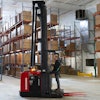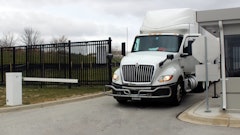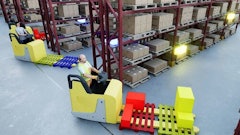Sep 14, 2000 (Tech Web - CMP via COMTEX) -- Kroger Co., the nation's largest grocery chain, last week posted strong second-quarter earnings and detailed a two-pronged Internet strategy: moving full-bore on its e-marketplace to streamline its supply chain, while taking a patient approach on the still unproven business of online grocery sales.
Kroger chairman and CEO Joseph Pichler told analysts last week that the company is intent on finding a profitable online shopping formula -- it just hasn't done so yet.
"We're not waiting for somebody else to be successful and then jump on the bandwagon," Pichler said. "We are aggressively testing models, but so far we have not found one that meets the test for ROI."
By contrast, Kroger execs stressed the success of Kroger's B-to-B strategy. That was exemplified by its participation this summer in four GlobalNetXchange auctions, which were used to procure supplies for stores.
In March, Kroger became a partner in GNX, joining founders France's Carrefour Corp.; Britain's J Sainsbury; Germany's METRO AG; Oracle Corp. (stock: ORCL), Redwood Shores, Calif.; and Sears, Roebuck & Co.
While Pichler stressed that he's pleased with the exchange, he said the best is yet to come. GNX is now identifying a supply-chain software provider -- likely Oracle -- to provide CPFR (collaborative planning, forecasting, and replenishment) and other supply-chain apps, which GNX hopes to test with partner companies later this year.
Kroger expects the exchange's links to suppliers to increase distribution efficiencies and reduce the cost of purchasing food products.
With more than 2,300 supermarkets in 31 states, Kroger is king of the U.S. food retailing hill. Its $13 billion merger in 1999 with Fred Meyer stores helped push annual sales to $43 billion in 1999.
And while competitors Albertson's and A&P recently announced disappointing earnings, Kroger's performance only solidified its position.
"With the exception of Kroger and Safeway, all of the big grocery chains are having problems," especially with digesting recent acquisitions, said PaineWebber analyst R.T. Quinn.
Kroger earnings met analysts' expectations at 28 cents per share, or $234.5 million, an increase of 16 percent from $202.1 million, or 24 cents per share, a year ago. Sales reached $11 billion, up from about $10.3 billion in second quarter 1999.
After the results were announced Sept. 12, Kroger stock closed at $23.25, down 13 cents.
Like many of its brick-and-mortar competitors, Kroger has just dipped a toe in e-retailing, with only its King Soopers unit in Colorado offering online grocery shopping. Similarly, Albertson's has pilot online programs in the Dallas and Seattle areas.
But Kroger is still seeking ways to take advantage of the Internet to reach consumers, said Rodney McMullen, executive vice president of strategy, planning, and finance.
Kroger continues to analyze online shopping models, McMullen said, as well as its Colorado operation and its experience with the online retailer Peapod Inc. (stock: PPOD), with which it signed an exclusive online sales agreement in 1996 for the Columbus, Ohio, area.
Struggling, Peapod, Skokie, Ill., this month ended that agreement, and exited the Columbus market.
Bricks-and-clicks retailers like Kroger are more likely to find success on the Internet than their strictly Web-based competitors, McMullen asserted.
"Success is more likely with [a business] that begins with strong market share," he said.
Delivery costs remain the biggest challenge to online grocery sites, McMullen added.
Equities analysts also pooh-poohed the near-term impact of online shopping on giants such as Kroger. Like Albertson's and Safeway, Kroger is "experimenting with low-cost ways to get their feet wet," said Jonathan Ziegler, analyst with Deutsche Bank Alex Brown.
"When they're ready to rock n' roll, they'll be better, more knowledgeable," Ziegler said.
But analysts agreed with Kroger executives that the supermarket business' real Internet future is in B-to-B exchanges.
The grocery industry supply chain today is "very inefficient and involved, with an awful lot of problems," Ziegler said, and therefore ripe for online efficiencies. "Exchanges are going to make the industry more productive."















